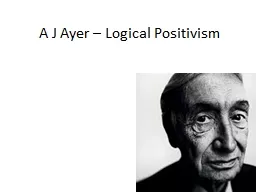PPT-The logical problem of evil
Author : tatyana-admore | Published Date : 2018-02-26
Michael Lacewing enquiriesalevelphilosophycouk c Michael Lacewing The problem of evil If God is supremely good then he has the desire to eliminate evil If God is
Presentation Embed Code
Download Presentation
Download Presentation The PPT/PDF document "The logical problem of evil" is the property of its rightful owner. Permission is granted to download and print the materials on this website for personal, non-commercial use only, and to display it on your personal computer provided you do not modify the materials and that you retain all copyright notices contained in the materials. By downloading content from our website, you accept the terms of this agreement.
The logical problem of evil: Transcript
Download Rules Of Document
"The logical problem of evil"The content belongs to its owner. You may download and print it for personal use, without modification, and keep all copyright notices. By downloading, you agree to these terms.
Related Documents














